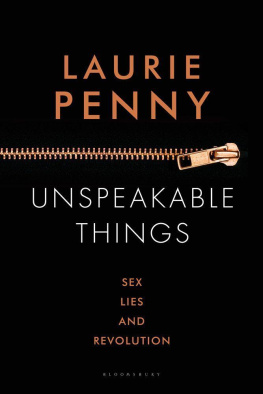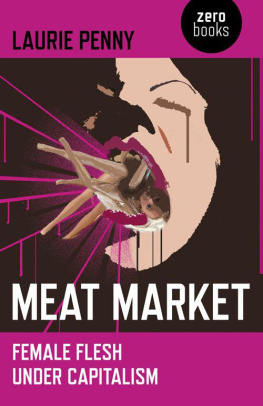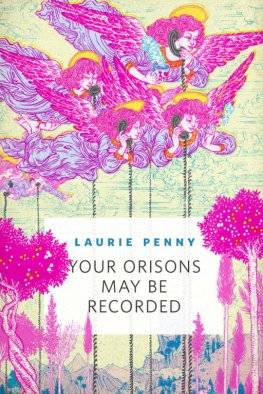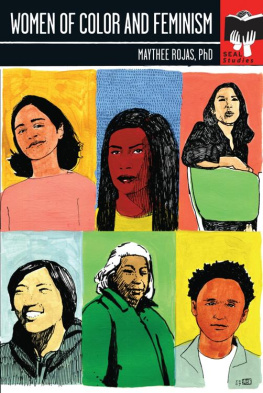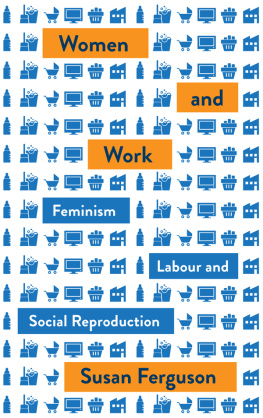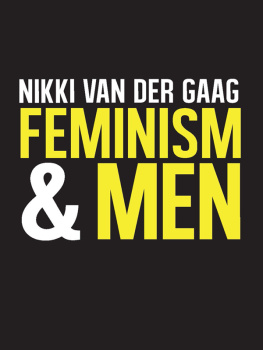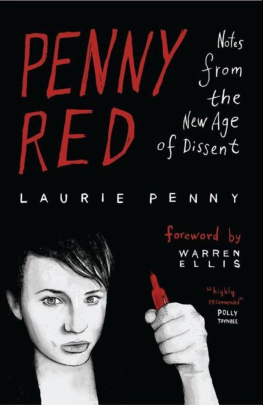
For Roz Kaveney
and
for G. E. B. and E. K. P.
Please hold my handbag, Im wrestling the angel
Thats nesting like a hen in the corner of my life.
She bends to me and simpers will you never change, girl?
You cant change this strange world. Why not be a wife?
Sophia Blackwell, Wrestling the Angel, Into Tempatation
Fuck heroes, fight now
graffiti, Athens 2011
Contents
So many people have given time and energy to this project that I can only hope its halfway worthy of their efforts. Thanks go, firstly, to my agent, the magical Juliet Pickering at Blake Friedmann, for all her hard work. To Bill Swainson, who always believed in this book, and to Sophia, Oliver and everyone at Bloomsbury. To Helen Lewis at the New Statesman , and Jason Cowley, who gave me my start.
Endless thanks, too, to Cath Howdle, Charlie Hallam, Zoe Stavri, Adrian Bott, Natasha Lennard, James Butler, Nick Lezard, Richard Seymour, Maria Dahvana Headley, Mariya Protzenko, China Miville, Rachel Rosenfelt, Jed Weightman, Leigh Alexander, Kitty Stryker, Willow Brugh, Clay Shirky, G. Balfe, Jo Afiya W, Benjamin Baker, Katrina Duncan, Neil Girling, Kiera James, Eleanor Saitta, Meredith Yayanos and Emma Felber, friends who held me up in hard times and gave vital feedback on early drafts. So did Janice Cable, who made a home for me when I ran away to New York to write and Im grateful for her wisdom, beauty and tolerance for loud late-night tea-making. Paul Mason was the friend and mentor every young journalist dreams of having, but few are lucky enough to find.
Stoya, Buck Angel, Akynos Shekera, Cindy Gallop, Meg Barker and Kate Bornstein lent their time and insight as interviewees. Molly Crabapple, my muse and hero, let me crash on her carpet over countless nights drinking espressos and arguing sex and syntax, and like any true friend, she never let me give up. Nor did Roz Kaveney, poet, philosopher, activist, wicked auntie, fairy godmother, to whom these pages are dedicated. My mum brought me up to be brave, and put up with me not doing my fair share of the Christmas washing-up because I had deadlines. My baby sisters inspire me to keep fighting every day. Our dad, Raymond Barnett ( 1948 2013 ), never got to see this book finished, but I owe him everything. Thanks, Dad. I love you.
This is not a fairy tale.
This is a story about how sex and money and power put fences around our fantasies. This is a story about how gender polices our dreams. Throughout human history, the most important political battles have been fought on the territory of the imagination, and what stories we allow ourselves to tell depend on what we can imagine.
Women, like any oppressed class, learn to fear our own rage. Our anger is legitimately terrifying. We know that if it ever gets out, we might get hurt, or worse, abandoned. One sure test of social privilege is how much anger you get to express without the threat of expulsion, arrest, or social exclusion, and so we force down our rage like rotten food until it festers and sickens us.
This is a feminist book. It is not a cheery instruction manual for how to negotiate modern patriarchy, with a sassy wink and a thumbs-up. It is not a charming, comforting book about sex and shopping and shoes. I am unable to write any such thing. I cannot force a smile for you. As a handbook for happiness in a fucked-up world, this book cannot be trusted.
Nor is this an academic study its a polemic grounded in research, experience and years of writing and campaigning on the queer and feminist scenes in Britain and America and online. I have seen enough women shamed for speaking of rape or threatened with death for seeking basic reproductive healthcare; enough men beaten or bullied to suicide for not acting straight enough; enough people of both sexes and every gender driving themselves to despair in order to live up to stereotypes of success that they never chose.
This is a book about love and sex in austerity, about gender under neoliberalism. Neoliberalism refers to the attempt to reorganise society and the state on the basis of an ideal of the market. Neoliberalism proclaims that the logic of business and money is the best determinant of human happiness. Neoliberalism also says that human beings cant be trusted, so the market must necessarily dictate what the people want. Every category of human interaction, therefore from the public sector to the intimate adventures of love and lust must be made to work more like a market, with in-built competitive mechanisms and cost controls. Every personal choice, including democratic choice, must be subsumed into the logic of the market: flesh itself can be remoulded for profit.
We are told that this is what liberty looks like. Neoliberalism is an attempt to build a Machinery of Freedom, in the words of David Friedman, in which human beings are economic creatures first and foremost. Everything we do should be about maximising utility, whether its in a relationship, in a job, or in social situations. The self is just an entrepreneurial project. The body is just human capital, a set of resources whether the brain, the breasts or the biceps which can be put to work generating an income stream.
This affects everyone but women most of all. Women are more likely than men to perform labour that is socially necessary but low waged or unwaged, and more likely to need public services and welfare. In this nominally freer and more equal world, most women end up doing more work, for less reward, and feeling pressured to conform more closely to gender norms.
Neoliberalism, while extolling the career woman, reviles poor women, women of colour, sex workers and single mothers as hopeless dependants, sluts and thieves. Thats why the career woman is a neoliberal hero: she triumphs on the markets own terms without overturning any hierarchies.
The career woman is the new aspirational ideal for young girls everywhere: she is a walking CV, her clothing, make-up and cosmetic-surgery choices merely means of upgrading her erotic capital to generate more income for herself or her boss. She is always beautiful, invariably white, and almost entirely fictional. Nonetheless, it is her freedom that is prioritised, as states across the world cut services and provisions for poor women while championing the cause of women in boardrooms. Neoliberalism colonises our dreams. It cannibalises our ideals of freedom and regurgitates them as strategies of social control.
This is a feminist book in that it raises feminist politics as a solution to the colonisation of the most essential of our passions by money and hegemony. It also has dirty bits. If youre only interested in those, skip to Chapter 5.
I started writing this book in the middle of a student occupation, curled up with the laptop on my knees while young people staggered in bruised and shaken, having seen their friends cuffed and beaten for daring to stand in front of their parliament building and demand a better future. I wrote the rest in notebooks, in strange apartments above occupied public squares as police and protesters clashed on the wasted dreamscapes of neoliberalism. I watched the young naive middle-class women and men of the twenty-first century learn the true nature of the world they live in. I watched all this happening, and I believe that there is hope. I believe that if anything can save us in this fraught and dazzling future, it is the rage of women and girls, of queers and freaks and sinners. I believe that the revolution will be feminist, and that when it comes it will be more intimate and more shocking than we have dared to imagine.
This book will not help you find a man, fix your hair or keep your job. This is a book about love and sex, beauty and disgust, power and passion and technology. It is a book about the intimate territory of unrest. I wrote it in unfamiliar cities, in conversation with teenage runaways, radical feminists, anarchists, hipster kids, sex workers, mad artists, convicted criminals, transsexual activists and sad young women in small towns longing for adventure.
Next page
